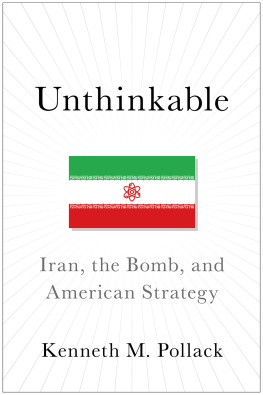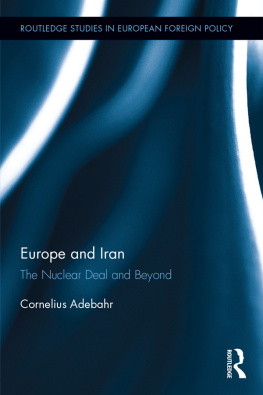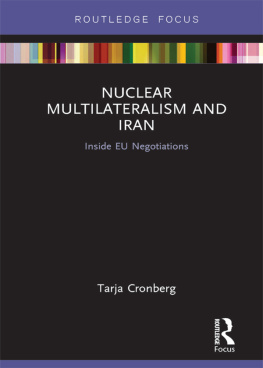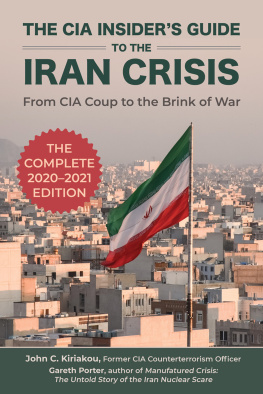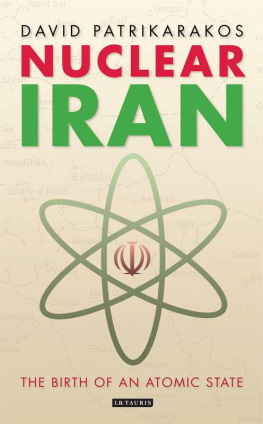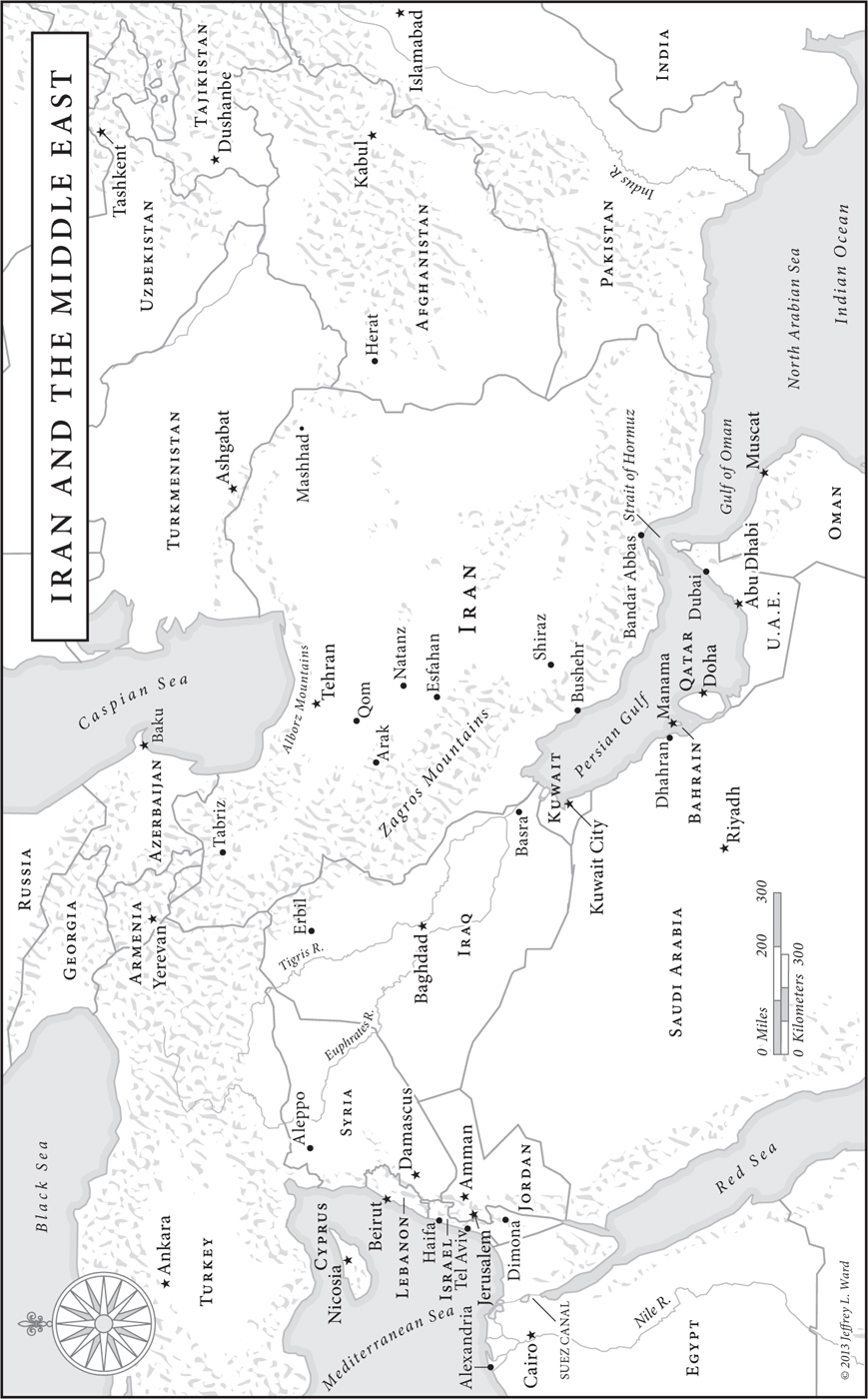Thank you for downloading this Simon & Schuster eBook.
Join our mailing list and get updates on new releases, deals, bonus content and other great books from Simon & Schuster.
C LICK H ERE T O S IGN U P
or visit us online to sign up at
eBookNews.SimonandSchuster.com
We hope you enjoyed reading this Simon & Schuster eBook.
Join our mailing list and get updates on new releases, deals, bonus content and other great books from Simon & Schuster.
C LICK H ERE T O S IGN U P
or visit us online to sign up at
eBookNews.SimonandSchuster.com
ALSO BY KENNETH M. POLLACK
Arabs at War:
Military Effectiveness, 19481991
The Threatening Storm:
The Case for Invading Iraq
The Persian Puzzle:
The Conflict Between Iran and America
A Switch in Time:
A New Strategy for America in Iraq
Things Fall Apart:
Containing the Spillover from an Iraqi Civil War
Which Path to Persia:
Options for a New American Strategy Toward Iran
A Path Out of the Desert:
A Grand Strategy for America in the Middle East
Unfinished Business:
A New American Strategy for Iraq Moving Forward

Simon & Schuster
1230 Avenue of the Americas
New York, NY 10020
www.SimonandSchuster.com
Copyright 2013 by Kenneth Pollack
All rights reserved, including the right to reproduce this book or portions thereof in any form whatsoever. For information address Simon & Schuster Subsidiary Rights Department, 1230 Avenue of the Americas, New York, NY 10020.
First Simon & Schuster hardcover edition September 2013
SIMON & SCHUSTER and colophon are registered trademarks of Simon & Schuster, Inc.
The Simon & Schuster Speakers Bureau can bring authors to your live event. For more information or to book an event contact the Simon & Schuster Speakers Bureau at 1-866-248-3049 or visit our website at www.simonspeakers.com.
Designed by Ruth Lee-Mui
Jacket design and illustration by Base Art Co.
Library of Congress Cataloging-in-Publication Data
ISBN 978-1-4767-3392-0
ISBN 978-1-4767-3394-4 (ebook)
All statements of fact, opinion, or analysis expressed herein are those of the author and do not reflect the official positions or views of the CIA or any other U.S. Government agency. Nothing in the contents should be construed as asserting or implying U.S. Government authentication of information or Agency endorsement of the authors views. This material has been reviewed by the CIA to prevent the disclosure of classified information.
For Barry Posen and Stephen Van Evera,
Who taught me how to think

Contents

Introduction
COMING TO THE CROSSROADS
S ince 2002, when the world learned of Irans progress toward acquiring a nuclear weapons capability, the United States has endured a protracted crisis with the Islamic Republic. It has been painful and frustrating, as all interactions with the Iranian regime typically prove. There have been moments of success. The United States has helped forge a broad coalition of states that have imposed unprecedented sanctions, isolation, and other forms of punishment on Iran to try to convince it to negotiate an end to its nuclear program, albeit to no avail. Iran today is weaker, poorer, and more friendless than ever. Yet for all its successes, the policy has not achieved its ultimate goal and may never do so. In spite of all the pain Iran has suffered, its leaders remain determined to acquire the capacity for nuclear weaponryand perhaps to field an arsenal once they have done so. There may still be some options for the United States, short of war, to prevent Iran from crossing the nuclear weapons threshold, but their number is dwindling, as is the likelihood that they will succeed.
This presents us with a dilemma over what to do next. Having tried the easy options and many hard ones, too, it looks increasingly likely that we will soon have to make the hardest choice of all: whether to contain a nuclear Iran or go to war as the final option to prevent one.
That decision is the principal focus of this book.
The debate has already begun. Many on the right have already begun to advocate for an attack on Iran. Others who recognize that Americas war-weariness after Iraq and Afghanistan makes it politically impractical to call openly for war with Iran have instead begun to argue that no alternative to war is viable. Meanwhile, many on the left are pleading that war is unnecessary or that it would be disastrous. Some have begun to argue that containment offers a better alternative.
Both sides know the ultimate fork in the road of Americas Iran policy is approaching. We are not there yet, but we may be there soon. It is time to begin to consider those choices so that we can make the best one, rather than having one forced upon us. None of the options we have left when it comes to dealing with Irans nuclear arsenal are good ones. Events overtook the good options long ago, leaving a bunch of difficult long shots. If our last chances all fail, as seems distressingly likely, we will have only the two worst options left: war or containment.
I believe that going to war with Iran to try to prevent it from obtaining a nuclear arsenal would be a worse course of action than containing Iran, even a nuclear Iran. However, I do not believe that the military option is foolish, and I believe that there are much stronger arguments in its favor than was the case even a few years ago. I simply believe that it entails more costs and risks than containmentexcept in some very specific circumstances. I will explain why in the course of this book.
Although frequently misrepresented, at its heart, containment is a strategy that seeks to prevent Iran from expanding beyond its current borders or destabilizing the Middle East until the regime collapses of its own internal contradictions. It is the strategy that the United States has employed against Iran since the earliest days following the Islamic Revolution. It is not appeasement. It does not mean simply acquiescing to Irans acquisition of nuclear weapons, let alone to its dominance of the Persian Gulf region. Indeed, there are many varieties of containment, some more passive, some very aggressive. If we continue to pursue containment toward Iran in the future, one of the most important questions we will have to address is when to employ a more assertive brand of containment and when to hold back and focus more on its defensive aspects.
I also recognize that containment is nothing but the less bad of the two final options. Perhaps more important than which option we choose, the worst thing of all we could do would be to refuse to think through our choice beforehand. Frequently, a politically expedient denial of reality has left us unprepared for unfortunate choices. On those occasions, we have stumbled into one policy or another, and the result has often been disastrous.
Many Americans believe that the invasion of Iraq in 2003 was our nations greatest foreign policy mistake since Vietnam. That war was born of the failure of our efforts to contain Saddam Husayns Iraq in the 1990s, and that failure was itself the result of our unwillingness to recognize the need to contain Saddams regime for the long term back in 1991. At that moment, at the end of the Persian Gulf War, Americas leaders assumed that Saddam would be overthrown by his generals. They designed U.S. policy toward Iraq based on this assumption without any consideration of backups or alternatives. When Saddam survived, the United States was forced into a containment policy for which it had not planned. When that policy crumbled less than a decade later, it left the American people with the worst choices of all and convinced President George W. Bush (and the majority of the American people, who supported him at the time) to invade Iraq. Yet the worst decision was not the decision to invade, but the insistence that it was not necessary to plan or prepare to occupy, secure, and rebuild Iraq. And that mistake stemmed from the Bush 43 administrations willful denial that such a massive undertaking would be necessary.
Next page
